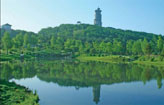Economy
US remains big player in Latin America
Updated: 2011-04-21 07:57
By Ma Liyao and Li Lianxing (China Daily)
"The United States maintained intensive diplomatic contacts with the LAC region during the past year, hoping to improve its relations with countries in the region," wrote He Shuangrong, a professor at the Institute of Latin American Studies at the Chinese Academy of Social Sciences, in its report on the region's development in 2010-2011.
A survey of 18 LAC countries conducted by Chilean research company Latinobarmetro in 2010 showed that the US' image clearly improved after President Barack Obama took office.
US "hard power" was also enhanced in the region by strengthened military cooperation with LAC countries, said the report.
The US held a political and military affairs dialogue with Chile last April and a series of security dialogues with other LAC countries last May.
At the same time, it made efforts to enhance cooperation with LAC countries in fields such as energy, climate change and culture.
"But this cooperation lacks substance and sizable funds," the report said.
US economic aid to the LAC region has dropped since the outbreak of the global financial crisis in 2008.
Regional countries' expectations of the US also declined, and they started to look for other options to develop more diversified international relationships.
Argentine President Cristina Fernandez de Kirchner said last April when meeting Russian President Dmitry Medvedev that the world has changed, and "we are no longer a backyard of another country".
Speculation that China would take over the US' place in the LAC region has been in the media ever since China's economic cooperation with the countries improved significantly following the outbreak of the financial crisis.
But "mainstream analysts in the US do not regard China as a zero-sum competitor of the US in the region", though there has been no completely consistent conclusion, said Wu Baiyi, a Latin American studies expert at the Chinese Academy of Social Sciences.
"China, as a new player in the LAC region, is still basically an economic one, rather than a political or military one," he said.
"It's not likely and not necessary for China to replace the US in the LAC region, because the cultural links between them are very close."
'Chilean model'
Chile is the first LAC country to leave the "middle income trap", making it a model for regional development, according to the report.
It noted that the country's stable and comprehensive transition, both economic and political, was a "demonstrative experience".
Countries in the LAC region are stuck in the "middle income trap", hovering around a similar level while being unable to make noticeable progress.
Through comparative studies, European, American and Latin American scholars discovered a parallel between this concept and the LAC's "fixed" contribution to the world's total GDP in the same period.
Chile entered the category of middle-income countries under the World Bank standard in the 1970s.
It has remained there ever since, although it enjoyed the fastest economic growth in the region.
In 2005, Peter DeShazo, director of Americas program at the Center for Strategic and International Studies in Washington, wrote that "the nations of Latin America have long sought to rise above the status that has often been called 'underdevelopment'".
"None to date has achieved that goal, but Chile is close," DeShazo said.
The International Monetary Fund predicted that Chile's per capita GDP will surpass $12,000 in 2012, making it the first in the LAC region to become a high-income country.
China Daily
Specials

Costly dream
Uninhabited havens up for lease but potential customers face wave of challenges.

Models gear up car sales
Beauty helps steer buyers as market accelerates.

Urban breathing space
City park at heart of industrial hub positions itself as top tourism attraction